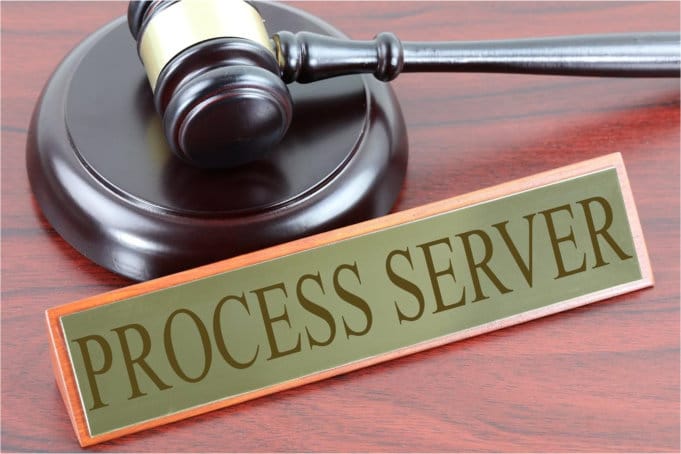Just How Process Serving Improves Lawful File Handling and Distribution
Just How Process Serving Improves Lawful File Handling and Distribution
Blog Article
Recognizing the Value of Process Serving in Legal Treatments
Process offering is a basic aspect of legal procedures that makes certain all events are informed of their legal rights and responsibilities. By assisting in the formal shipment of necessary legal records, it supports the concepts of due procedure and contributes to the integrity of the judicial system. The subtleties of efficient process serving prolong past simple distribution; they encompass legal requirements and prospective effects of incorrect solution. Recognizing these complexities can considerably impact the results of lawful disagreements, triggering a better assessment of the practices that underpin this crucial function.
Interpretation of Refine Offering
Refine offering is a critical element of the legal system, defined as the formal distribution of lawful documents to people entailed in a litigation. This process makes certain that all events are appropriately educated of legal actions being taken against them or to which they are a celebration. Normally, these documents consist of summons, issues, subpoenas, and various other court-related papers that need the recipient's interest and feedback.
The value of procedure serving depend on its role in promoting the concepts of due process. It assures that people have notice of lawful process, thus giving them a possibility to react or defend themselves. Proper solution of procedure is not simply a procedural formality; it is an essential facet of ensuring fairness and openness in the judicial system.
Refine offering can be conducted by different individuals, including specialist process-server, police policemans, or perhaps lawyers, depending on administrative policies. Each method of service has its own criteria and practices, which are essential to preventing hold-ups or terminations within the legal structure. As a result, recognizing the interpretation and feature of procedure offering is essential for all stakeholders entailed in legal procedures.

Lawful Requirements for Process Serving
Legal demands for process offering are vital to ensure that the delivery of lawful papers adheres to established protocols and is recognized by the court. Each territory has specific legislations governing how and when records need to be offered, which might consist of issues, subpoenas, and summonses.
Typically, procedure web servers need to be objective 3rd parties who are not associated with the situation. They must also adhere to state regulations regarding solution techniques, which can include personal service, alternative service, or service by mail. Individual solution includes providing files directly to the recipient, while alternative solution enables distribution to an additional accountable individual at the recipient's house or location of service.
Furthermore, process-server are generally needed to submit an evidence of service, a legal paper that confirms the distribution of documents, with the court. This record consists of information such as the date, time, and technique of solution, in addition to the name of the person served.

Function in the Justice System
A vital component of the justice system, procedure serving makes certain that individuals included in legal process are properly informed of actions taken versus them (Process Serving). This formal alert is important for maintaining the concepts of due procedure, which mandates that parties have the possibility to react to claims made against them. Without effective process their explanation serving, the legal system would Visit Your URL be rendered inefficient, as people can engage in actions without awareness of pending lawful issues
Process-server serve an important duty in guarding the honesty of the legal procedure. They serve as neutral celebrations, delivering lawful records such as summons, problems, and subpoenas, hence promoting transparency and liability within the judicial framework. By ensuring that all events are notified, procedure serving helps to stop any type of possible unjust benefit, enabling for fair participation in lawful proceedings.
Moreover, the expertise of process-server adds to the public's rely on the justice system. Their adherence to honest methods and legal standards enhances the authenticity of the judicial procedure. Inevitably, effective procedure serving is important in advertising the guideline of law and ensuring that justice is easily accessible to all individuals associated with legal disagreements.
Repercussions of Improper Service
The repercussions of inappropriate service can substantially threaten the integrity of lawful process. When an event is not served correctly, it can cause a host of problems, including delays in the event timeline and enhanced legal costs. Incorrect service can cause the defendant not being conscious of the legal activity versus them, which may prevent them from responding suitably or presenting their protection. This absence of notice can eventually cause skip judgments, where the court policies in favor of the plaintiff without hearing the accused's side.
Additionally, improper service can render court orders and judgments void, forcing the plaintiff to reactivate the procedure, which can be both financially difficult and lengthy. It can also unlock to obstacles and appeals, as the offender might argue that they were not appropriately notified of the proceedings, complicating the lawful landscape better.
Ideal Practices for Effective Service

Second, timing plays a vital duty. Serving files promptly can prevent delays in lawful process and ensure that all parties are notified in a timely way. Additionally, employing a professional process web server can boost efficiency, as they are educated to browse possible challenges and make certain compliance with regional laws.
Third, maintaining accurate documents of the service procedure is necessary. If disagreements occur relating to whether service was properly performed., documenting the day, important source time, and way of service can supply essential proof.
Conclusion
In final thought, process serving is a necessary part of legal procedures, guaranteeing that all parties are appropriately notified and afforded the possibility to respond. Following lawful demands and finest techniques not only maintains the concepts of due procedure however additionally strengthens the honesty of the justice system. The repercussions of incorrect service can lead to substantial delays and difficulties, highlighting the requirement for efficient process serving in advertising fairness and accessibility in lawful disagreements.
The subtleties of effective procedure offering extend beyond plain shipment; they include lawful needs and potential effects of improper service.Refine offering is a critical element of the legal system, defined as the official distribution of lawful files to individuals involved in a court case. Without efficient process offering, the legal system would be rendered ineffective, as people could engage in activities without understanding of pending lawful issues.
Process web servers offer an essential function in protecting the integrity of the legal process - Process Serving. The consequences of improper solution can lead to substantial hold-ups and problems, highlighting the necessity for efficient procedure serving in promoting justness and availability in legal disputes
Report this page